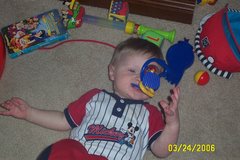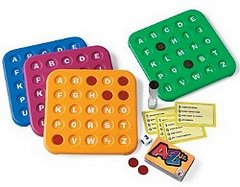Discovery Toys Can Help! Understanding autism, selecting the right toy to help, and understanding how to use it.
For 28 years, Discovery Toys has focused on learning through play, delivering countless products specifically designed to maximize learning moments across age groups and skill categories. The most effective learning environment for any child is one tailored to that child’s specific needs at each stage of development.
Discovery Toys has interfaced with the famous Princeton Child Development Institute to develop our Autism Support Project. It is our goal to deliver a rich educational experience by understanding the most commonly shared learning difficulties for children with autism and matching our products to support learning. Children with autism tend to experience several broad areas of significant difficulty.
Look for the following symbols throughout our online shopping cart to find products that help support learning in these areas.
Toys to develop independent play with some limited instruction.Children with autism often have difficulty playing independently. They need toy choices that can be enjoyed following some initial instruction. Often memory recall can be an issue, as can the inverse, excessive repetition.
Toys that promote sustained engagement.Building up the length of time that any child focuses on an activity is important and great products facilitate this skill building.
Toys that build skills for cooperative play.All children have to be taught to cooperate with peers. For children with autism, the temptation to reside in a world of their own is very common. Awareness and necessity to share, communicate and take account of others’ actions can be built with great toys.
Toys that create opportunities for children to talk about their play experience. Verbalizing the play experience is a vital step in the learning process that actively supports skill development and academic and social progress. It is important that you understand and make use of open-ended questions to foster conversation.
Toys with obvious completion criteria.The ritualistic and repetitive behavior often seen in children with autism may deprive them of understanding when a task is completed, thus missing an essential sense of accomplishment.
Toys that encourage pretend play.
Some children find pretend play comes naturally, others need to be shown how to develop make-believe games, and children with autism tend to be among those needing a little help!
For more information about the Autism Support Project, contact your Educational Consultant. If you need help in finding a Consultant, click on www.discoverytoyslink.com/michelemarchetti
Michele Marchetti
203-672-0681
Subscribe to:
Post Comments (Atom)




No comments:
Post a Comment